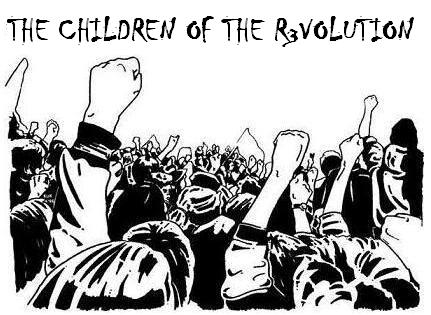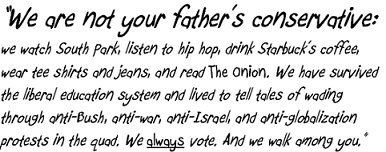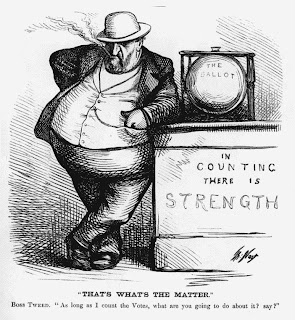I
A common theme for liberals, upon losing an election or fearing it lost, is to bandy about accusations of voter intimidation and voter fraud. I imagined that this year might, despite all odds, see a collective silence on this issue from the liberals, as ACORN’s embarrassing victory in the “Best Scheme To Defraud The American Electorate” category could make it seem slightly disingenuous. However, I find myself reminded of how slavishly devoted they are to their talking points as they reliably trot out the usual accusations of electoral tampering, though they stealthily waited for November 3rd in order to minimize the discussion. As the ACORN debacle has demonstrated, voter fraud, be it by registration or otherwise, is indeed a serious and despicable crime that has sadly become a conventional tactic for both parties, though it has been a more visible boon for Democrats. It famously elected Kennedy over Nixon, and it may well elect Obama over McCain. What is less serious to me, and borders on incomprehensible, is this much-wielded concept of voter intimidation.
Real voter intimidation is what occurred in the American politics of the 19th century, when political bosses such as New York City’s William "Boss" Tweed would threaten voters with physical harm if they didn’t fall in line, and often made good on those threats. It occurs today in Third World countries, most recently in Zimbabwe, when Robert Mugabe’s political rivals were murdered, intimidated and jailed after winning a national election that Mugabe declared illegitimate days later. That is voter intimidation. What voter intimidation is not is a phone call from a charlatan telling you that the federal government has decided to have an election day for Republicans on November 4th and for Democrats on November 5th. It is not getting a flyer that says you’ll be arrested at the polls if you have prior criminal offenses. It is not being told by someone claiming to be a campaign volunteer to cast your ballot over the phone. It is not being asked to provide an ID or other form of documentation that you are in fact you. These are not physical limitations on your ability to vote or credible threats to your security if you do. Moreover, laws exists that would be readily enforced and happily reported by the media if they were. The bottom line is that your right to vote is so well protected, even if you’re not legally permitted to, that voter intimidation has become a myth in this country.
The best example of how loose the definition of voter intimidation has become is the requirement to show photo ID in many states, such as Ohio, in order to vote. To most Americans, this is common sense. However, the ACLU and other “voter’s rights” organizations claim this is a form of intimidation, when what they really mean is that it is a threat to the politically profitable black market trade in voter fraud. The Supreme Court has rightly ruled in favor of such laws despite the suspicious protests, and anyone who is familiar with the Ohio law knows that “a current utility bill (including cell phone bill), bank statement, paycheck, government check, or other government document that shows the voter’s name and current address (including from a public college or university)” is acceptable (see here). So everyone is pretty much covered, even if, as the ACLU argues, they’re a senior citizen who isn’t able to obtain a driver’s license (or some such rot).
Your right to vote is sacred, and Americans should rightly and jealously view it as such. We live in a country where party brownshirts don’t hang about outside the polling place with billy clubs. We live in a country with a secret ballot, where how you vote is nobody’s business. We live in a country where the government bends over backwards to ensure your right to vote is not infringed upon, from both real and imaginary threats. If you’ve legally registered to vote (and if you have, you'll know it) and your right to vote is really infringed upon by, say, a guy with a gun or knife or even a police officer who refuses to let you in the polling place, you have all the legal recourse in the world to make whoever it is that stood in your way pay dearly. Furthermore, all you’d have to do is whisper the words “voter fraud” and a reporter from CNN will be shoving a microphone in your face. But there’s more: the sacredness of the right to vote means that anyone who does so illegally or conspires to aid another in doing so should face the steepest penalty allowed by law, be they Republican or Democrat.
Real voter intimidation is what occurred in the American politics of the 19th century, when political bosses such as New York City’s William "Boss" Tweed would threaten voters with physical harm if they didn’t fall in line, and often made good on those threats. It occurs today in Third World countries, most recently in Zimbabwe, when Robert Mugabe’s political rivals were murdered, intimidated and jailed after winning a national election that Mugabe declared illegitimate days later. That is voter intimidation. What voter intimidation is not is a phone call from a charlatan telling you that the federal government has decided to have an election day for Republicans on November 4th and for Democrats on November 5th. It is not getting a flyer that says you’ll be arrested at the polls if you have prior criminal offenses. It is not being told by someone claiming to be a campaign volunteer to cast your ballot over the phone. It is not being asked to provide an ID or other form of documentation that you are in fact you. These are not physical limitations on your ability to vote or credible threats to your security if you do. Moreover, laws exists that would be readily enforced and happily reported by the media if they were. The bottom line is that your right to vote is so well protected, even if you’re not legally permitted to, that voter intimidation has become a myth in this country.
The best example of how loose the definition of voter intimidation has become is the requirement to show photo ID in many states, such as Ohio, in order to vote. To most Americans, this is common sense. However, the ACLU and other “voter’s rights” organizations claim this is a form of intimidation, when what they really mean is that it is a threat to the politically profitable black market trade in voter fraud. The Supreme Court has rightly ruled in favor of such laws despite the suspicious protests, and anyone who is familiar with the Ohio law knows that “a current utility bill (including cell phone bill), bank statement, paycheck, government check, or other government document that shows the voter’s name and current address (including from a public college or university)” is acceptable (see here). So everyone is pretty much covered, even if, as the ACLU argues, they’re a senior citizen who isn’t able to obtain a driver’s license (or some such rot).
Your right to vote is sacred, and Americans should rightly and jealously view it as such. We live in a country where party brownshirts don’t hang about outside the polling place with billy clubs. We live in a country with a secret ballot, where how you vote is nobody’s business. We live in a country where the government bends over backwards to ensure your right to vote is not infringed upon, from both real and imaginary threats. If you’ve legally registered to vote (and if you have, you'll know it) and your right to vote is really infringed upon by, say, a guy with a gun or knife or even a police officer who refuses to let you in the polling place, you have all the legal recourse in the world to make whoever it is that stood in your way pay dearly. Furthermore, all you’d have to do is whisper the words “voter fraud” and a reporter from CNN will be shoving a microphone in your face. But there’s more: the sacredness of the right to vote means that anyone who does so illegally or conspires to aid another in doing so should face the steepest penalty allowed by law, be they Republican or Democrat.








No comments:
Post a Comment